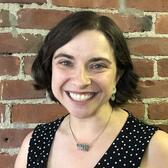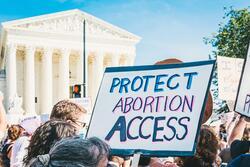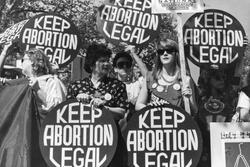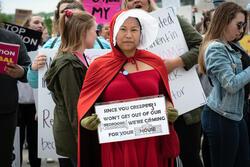We Must Take a Page from Jewish Reproductive Justice Activists and Continue the Fight
Last week, someone connected to the Supreme Court leaked a draft decision by Supreme Court Justice Samuel Alito that would overturn Roe v. Wade and nearly 50 years of legal precedent. If handed down as written, the decision would allow states to force women and other people with uteruses to carry pregnancies and give birth to babies against our will, stripping us of the basic human right to determine the course of our own lives and to control our own bodies.
My first reaction to the news was numbness, followed by rage, powerlessness, more rage, and mourning. Mourning for what so many generations of women fought so hard to get and preserve, and mourning for the untold number of people who will be harmed—and yes, killed—by this decision, in the likely event that it becomes official.
It’s been clear to me that Roe v. Wade would fall since the Supreme Court allowed to stand the horrific Texas law that invites bounty hunters to enforce a ban on abortions after six weeks But it’s one thing to know something is coming; it’s another to see it in writing, the acid contempt for our freedom on full display.
Yet despite it all, I am not feeling despair today. I am feeling clarity. Conservative politicians and legal experts have tried to pretend for years that this isn't where they were going, but they can't pretend anymore.
The weekend before the draft opinion was leaked, I taught a workshop on the history of Jewish reproductive justice activism to this year’s cohort of JWA Rising Voices Fellows. It was short, but they got a taste of:
1. Fania Mindell’s work with Margaret Sanger in opening the first birth control clinic in Brownsville, a mostly Jewish neighborhood in Brooklyn.
2. Elinor Guggenheimer, a philanthropist and activist who founded an organization to fight for public, high-quality child care in New York City for working mothers from the late 1940s to the 1960s, a time when public opinion was hostile to working mothers and to day care. She later expanded to found a national organization for day care.
3. The Clergy Consultation Service on Abortion, in which male clergy, including rabbis, helped women find abortion providers when it was still illegal to do so.
4. The radical feminist group Redstockings, consisting mostly of Jewish women, who disrupted a New York State senate hearing on abortion laws when the "expert" panel comprised fourteen men and one Catholic nun.
5. The abortion speakout that Redstockings held a month later, where women stood up in public and told their stories of having abortions, at a time when speaking of it was taboo and often meant confessing to a crime.
6. The creation of the book Our Bodies, Ourselves by the Boston Women's Health Book Collective (also mostly Jewish), which democratized information about women's bodies, including pregnancy, birth, and abortion, at a time when almost none was available to most women. They also tied the forced sterilization of women of color, the lack of affordable housing and medical care, the ideology of motherhood, and the disempowering of pregnant and birthing women by the medical establishment to the need for birth control and abortion rights.
7. Rosalyn Baxandall and Carol Nadelson separately founding feminist day care cooperatives on a sliding fee scale.
8. The JANE collective, founded by Heather Booth, a group of women who, in the years before Roe v. Wade became law, referred women to a safe, affordable abortion provider and later learned how to provide safe abortions themselves.
9. Rabbi Danya Ruttenberg, who teaches that Jewish law, under many interpretations, not only accepts but sometimes requires abortion, as when the mother’s health or life are in danger. In other words, while the Christian right would have you believe that "religion," as a broad category, is inherently opposed to reproductive rights, that is only true of some religious frameworks. Free exercise of religion under the Constitution requires that the right to an abortion be preserved.
And this is just a taste. In our workshop, we focused on Jewish activists, so our discussion didn't include the swaths of other powerful activists who fought for reproductive self-determination through abortion, birth control, anti-eugenics/anti-forced sterilization, anti-police violence, safe communities, adequate nutrition, and accessible and anti-racist, anti-sexist, trans- and queer-friendly medical care.
Why am I going into all of this? To show that there are as many different ways of working for reproductive justice as there are people. You can be someone who commits a big splashy attention-getting act of guerilla protest. You can gather and share information about how to get abortions safely. You can write letters to legislators. You can fund abortion providers. You can attend a mass protest. You can do peer education. You can provide money or other resources to someone who needs to travel out of state by donating to or volunteering with an abortion fund. You can lobby for governmental policies that protect pregnant people and ensure that they—and any children they choose to have—can access high-quality medical care, education, food, and housing. You can campaign for candidates who support the right of everyone to determine their reproductive lives.
The overturning of Roe v. Wade is going to cause immeasurable harm. But we can and will fight back and stand up for our lives and our communities.
It all matters. None of it is wasted.






